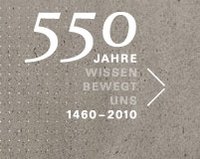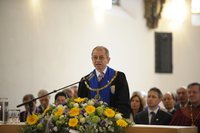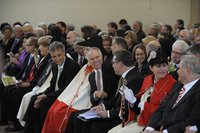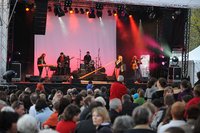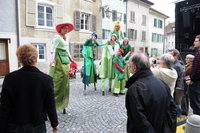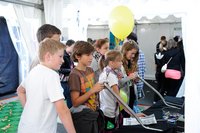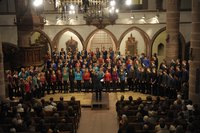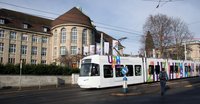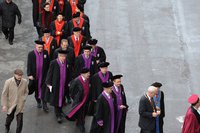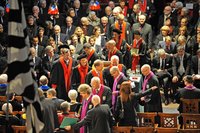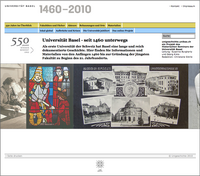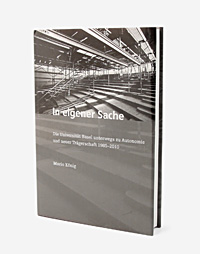“Moved by Knowledge” – the celebrations for the university’s 550th anniversary
In 2010, a series of stirring festivities commemorated the era of the university’s founding while looking forward to the future.
Major celebrations are often given a name, so that they may make a name for themselves. Basel’s local peer institutions have also recently celebrated anniversaries, creating their own slogans. In 2007, the Albert Ludwig University of Freiburg celebrated its 550th anniversary; the University of Zurich celebrated its 175th anniversary in 2008; and the University of Bern celebrated the following year. Freiburg celebrated with the motto “Bright Minds for a Better World – We Are the University”; Bern’s motto was “Knowledge Creates Value – An Anniversary for All”; and the University of Zurich’s chose the pithy phrase: “Sharing Knowledge.” In this spirit, University of Basel’s 550-year celebration also had a motto – “Moved by Knowledge” – alluding to the mobility of science and its capacity to stir emotions. Festivities were held in Basel and – for the first time, as part of an initiative called “Mobile Knowledge” – in Liestal, Porrentruy, and Aarau, highlighting increased regional collaboration and expressing hopes for future partnerships. The aim was to foster dialogue with the public and strengthen identification with the University of Basel’s brand by celebrating the institution’s long history and looking together toward the future.
“Moved by Knowledge” – a year of events in four cantons
The grand celebrations began on the weekend of 17 and 18 April, as the actual founding date of the university, 4 April, fell on Easter Sunday that year. The jubilee was officially opened in the city church in Liestal, where Rector Antonio Loprieno, Swiss Federal Councillor Moritz Leuenberger, and the government heads of Basel-Countryside and Basel-City delivered speeches to 200 invited guests from the fields of politics, culture, business, and science. At an event called the Market of Knowledge in Liestal’s old town, various university institutions and organizational units introduced themselves to the public and invited participation through workshops. As in 1960, the various festivities were intended to reach different target groups. A four-day Congress on Knowledge, held from 25 to 29 May in the university’s main building, was split into two parts. At the congress, internationally renowned researchers – albeit no women – gave public lectures, mostly in English. The Science and Fiction program consisted of a full-day workshop followed by a symposium with university neuroscientists and science fiction writers, aiming at popular science. For the major celebration in Basel from 17 to 19 September, the Market of Knowledge was held around St. Peter’s Square, significantly expanded and enhanced by concerts and shows from well-known entertainers. The idea of making knowledge mobile and presenting it as a modern form of knowledge transfer proved successful: some 80,000 visitors attended the Festival of Sciences in Basel, around 20,000 in Liestal, and about 5,000 each in Solothurn, Porrentruy, and Aarau. The program was tailored to a wide range of ages and target groups, with the city tour on 25 April, guided by women students, also drawing many participants.
Unlike previous occasions, the jubilee was explicitly aimed at a broadly defined “general public.” In 1960, members of the general public interested in attending the Day of Sciences had to obtain tickets, but the four guest lectures at the 550-year celebration’s Knowledge Congress by scientists from internationally renowned universities – including Nobel laureate Luc Montagnier – were open to the public. The event underscored the excellent networking and positioning of the University of Basel in international research and provided an opportunity to highlight the attractiveness of its research location. The four main themes of the congress – human beings, culture, world, technology – represented the core ideas to which the university committed itself in its 2007 strategic plan.
Exhibitions and a celebratory cantata
The Musicology Seminar, which also marked its 100th anniversary in 2010, hosted a celebratory concert on 18 October at the Stadtcasino. The centerpiece was Hans Huber’s “Cantata for the Jubilee of the University of Basel,” originally performed in 1910 for the university’s 450th anniversary. Swiss Radio DRS recorded and later aired the concert. Two days earlier, the Uni Ball and a gala dinner had been held in the festival hall of the exhibition grounds.
The year of festivities also included various exhibitions. On 24 April, the exhibition “Treasures of the University of Basel” was opened in the cathedral with an ecumenical vespers service and a lecture by Professor Arnold Esch (Rome). The exhibition featured artifacts from the university’s founding and early period, such as the papal Founding Charter, the rector’s matriculation book, and letters exchanged between Oecolampadius and Zwingli. A comprehensive catalog was published to accompany exhibition, with a team of scholars led by theologian Martin Wallraff, in collaboration with the University Library and the Basel State Archives, providing commentary on the exhibits. In April, the University Library opened the first part of the exhibition “Collecting, Examining, Making Visible,” which offered insights into the legacies of Basel scholars and former professors, including Basel’s first woman professor, the Slavicist Elsa Mahler. The second part of the exhibition followed in September, highlighting the history of book printing and the development of scholarly editions. In the Sculpture Hall, the Archaeological Seminar launched a special exhibition on “Cuba and Classical Antiquity,” which also began in September.
Symbolic sites to commemorate the university’s founding
As with previous anniversary celebrations, some events were held for invited guests, such as the closing ceremony at the Dies academicus in the Basel Cathedral and the subsequent banquet in the Grand Hall of the exhibition center; the Dies academicus celebration had been moved from St. Martin’s Church to the cathedral specifically to honor the university’s founding. On 26 November, the university organized a ceremonial procession from the Natural History Museum to the cathedral, with representatives of the various faculties marching in their academic robes. Following speeches by Rector Loprieno and Emil Angehrn, professor of philosophy, the faculties awarded honorary doctorates, faculty prizes, and other recognitions for outstanding achievements in research and teaching. A notable contribution was the cantata “So That the Spirits of the People May Be Enlightened and the Mind Illuminated,” composed by Georg Friedrich Haas for the jubilee and performed by the Ensemble Phoenix Basel, incorporating quotations from the Founding Charter granted to the university by the pope.
University history goes digital
A truly mammoth project realized as part of the jubilee was the scholarly treatment of the university’s history for this website, led by Susanna Burghartz and Georg Kreis, which also spurred a number of new studies, particularly on the university’s more recent history.
Since 2007, the Department of History has increasingly offered courses on the university’s history, several of which have led to contributions to this website.
New research on the university’s history has also appeared in print in several publications: historian Georg Kreis traced the university’s history through the development of its buildings in Orte des Wissens (Sites of knowledge) and Mario König examined the last twenty-five years of the university’s history in his study In eigener Sache (On our own terms, on our own behalf). Under the leadership of Emil Angehrn, one thread of history with wider implications for histories of knowledge was explored in September 2010 at the conference “Philosophy in Basel – Prominent Thinkers of the Nineteenth and Twentieth Centuries,” leading to the publication of a book with the same title in 2011. In 2010, a series of stirring festivities commemorated the era of the university’s founding while looking forward to the future.



